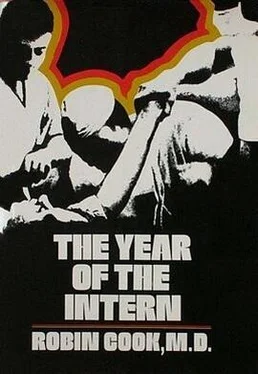“Of course I do, but that’s not the point. If you—”
“It is the point,” she interrupted.
“You’re changing the subject,” I protested.
“Well, it’s the only subject I’m interested in,” she said staidly, standing up and scraping back her chair. “Anyway, I’ve decided you can stop thinking about us, and drop dead.” She strode out indignantly.
Drop dead. A great suggestion. Actually, the idea held a kind of morbid appeal. I was that tired. With Joyce gone, the room moved away from me suddenly. A lot of people were still sitting around other tables, but not a soul was there with me. The sounds of a hundred voices mingled, all distant and incomprehensible. Staring through the window at the rain and the gray scudding clouds, I chewed absentmindedly, overcome by loneliness. Nothing remained of that good feeling after the gall bladder; in its wake, I was simply drained of all emotion. Looking at the clock, I realized I had been going full steam for thirty hours. I thought about the clinic, and that I should go over there. Interns are supposed to help with outpatients in their “free time.” But in my state I wouldn’t be of any use. To hell with the clinic.
Raindrops danced around the overhang as the wind whipped them into sheltered areas. It was surprisingly cold. When tired, the body cannot tolerate much in the way of temperature variation. So the chills I felt coursing through me were probably more a product of my physical condition than of the weather. I hurried along, concentrating totally on my bed, anticipating the pleasure. All interns develop an extraordinary appreciation for simple things others take for granted — free muscular movement; the right to relieve an itch, void one’s bladder, or empty one’s bowels; more or less regular meals; a decent amount of sleep. In bed, I felt my body sinking, growing tremendous and filling the room, until my huge body and the room gradually merged, became one, and I slept.
The abscess was small when I began, no more than a pimple. Now it was enormous, covering most of the left arm and growing. No matter how much I cut, more appeared; now it crept toward the shoulder. Behind me, Hercules was whispering to the Supercharger, “He’ll never make it. Neither will the patient.” For encouragement, I looked toward Simpson, who said, “Get it right the first time, Peters, or it’s Hicksville for you.” In one final, desperate effort, I slashed to the bone through tissue, and to my horror I severed the ulnar nerve, immobilizing the hand forever. Time’s up, I thought, as the bell rang; failure! It was, of course, the telephone. I leaped to answer it, still half in the dream and confused by the light. Had I missed rounds? No, they weren’t until five o’clock, and my watch indicated three. It was surgery. I had been put on a case scheduled to start in fifteen minutes.
Hanging up, I slowly regained orientation. Why should I have waked up in such a state of terror? Then I connected the dream with the incision and drainage I had done yesterday on a huge elbow abscess. After opening the abscess with a sharp blade, causing a spontaneous flow of pus, I had pushed in the tip of a hemostat clamp to insure good drainage. But the abscess was much deeper than I had expected; it seemed to extend to the area of the ulnar nerve. So I had cut down and down, never truly getting to the bottom of the abscess and finally quitting for fear I would cut the ulnar nerve, if I hadn’t already. Anyway, I decided to stop by now and check the case on the way to surgery.
The fright reflex had gotten me out of bed, but then my state of physical disintegration began to finger its way back. After having been up for so long, sleeping less than an hour just made everything worse. Nothing about me seemed to work right; I felt dizzy and slightly nauseous when I stood up after putting on my shoes. Unfortunately, I looked into the mirror — a serious mistake, because I realized I would have to shave to join the living. My hand was shaky, and, as usual, I cut myself a couple of times, not badly, but enough so that the blood kept running despite tissue, cold water, and a heavy, stinging application of styptic pencil.
I hurried over to the ward. It had stopped raining, although clouds still hung thick and heavy over the hills. My abscess patient was probably a bit startled when I ran into the room and asked him to hold up his hands and spread his fingers. As he did so, I tried to compress all the fingers together and got good resistance; that indicated his ulnar nerve was all right. I didn’t have time to see anybody else except my waterlogged edema patient, whose bed was right next to that of the abscess. He had a question about his diuretic pills that I couldn’t ignore.
I had developed a great respect for serious edema cases of the sort that requires a lessening of body fluids by one kind of diuretic or another. My awakening had been sudden and brutal — a carcinoma patient, transferred from a medical ward, who had swelled up through total body edema, a condition called anasarca. I decided that she was in that state because the medical department had missed the boat; there was always a little friction between those who cut — the surgeons — and those who treated with drugs — the medicine guys. This patient had cancer, diagnosed from a lymph-node biopsy. Although the primary site had never been found or the exact type of cancer determined, somebody decided to zap her with radiotherapy, which did nothing to the cancer, and then with chemotherapy, which was equally useless. Meanwhile, the patient was on IV’s, and the medical boys allowed her to gather so much water that her sodium and chloride levels dropped to the point where she was practically delirious. And they ignored her plasma proteins, which dropped as well. When I got the patient, I was determined to get rid of all that water. By giving her some albumin and a diuretic, I achieved some diuresis, and hence a slight improvement in the edema. But I wanted more. When I tried to get some advice, nobody was much interested, including the attending. Since her urine was alkaline, I decided to give her a good dose of ammonium chloride with the diuretic, and this time the results were spectacular. What a diuresis! Water. poured out of her as her urinary output soared. It was terrific, amazing — except that it would not stop, and overnight she dried up like a prune. Bronchopneumonia set in immediately, and she was dead in a day and a half. I had never said anything more to the medical guys about the case, but I was wary now of those diuretic agents. I was being very careful with this man next to the abscess. He was taking only pills.
Actually, I had learned to respect abscesses as well. There had been one patient — not mine, although I had seen him on rounds every day — who was admitted because of spreading cellulitis in his right leg from an abscessed area. When he came to us, most of his calf muscles had already liquefied. We cultured a number of different organisms out of that abscess; they all seemed to be working together against the patient. One day, when the intern handling the case was sick, I had to drain it. The smell was indescribable; once again I resorted to my three-mask ploy to keep from retching. As I attempted to open the abscess cavity, I realized that it went in every direction, as far as the hemostat would reach. An argument had raged off and on during rounds about whether his leg should come off, but advocates of a new method of continuous antibiotic perfusion won out — at least, they won the argument — and dripped gallons of antibiotic into his leg, seeming to stabilize him for a few days. But suddenly, one day while we were looking at him on morning rounds, the man died. We had just walked up to the bed, and another intern had started to say that the patient was “essentially unchanged.” Odd, how often that word “essentially” was used on rounds. This man had been in liver failure, heart failure, kidney failure — in fact, total body failure. But just as the intern was mouthing his neutral status report the patient gasped, and it was over. It seemed an act of enormous bad taste. We stood there dumbfounded. No one tried to resuscitate him, because all of us had become used to the hopelessness of his condition. Our insignificant drugs had only supported him precariously for a while, until the bottom fell out, as it had with those Gram-negative sepsis cases in medical school. It was as if he had absolutely no defense against the infection. Thus I came to respect abscesses. In fact, as time went on, I was learning to respect every illness, no matter how innocuous it appeared to be.
Читать дальше












